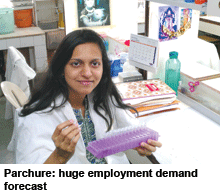Career options for microbiologists
The high-potential biotech industry has a lot to offer youth interested in biology, environment and ecology studies. Career opportunities in industry and corporates are numerous.
Microbiology is fast emerging as a popular career choice for 21st century youth. Hardly surprising given that microbes affect every aspect of life — negatively and positively. The world around us is replete with micro-organisms such as bacteria, viruses, fungi and protozoa, too small to be seen with the naked eye. A microbiologist’s job is to study these microbes living in diverse habitats, ranging from hot springs to the human body, and even in the depths of oceans, and devise ways and means by which their beneficial qualities can be harnessed for human good, and their adverse effects on human health and well-being combated.
But while microbial organisms often cause disease, they can also be used to develop antibiotics which build immunities to them. Moreover, while some micro-organisms cause food spoilage, others are essential for its production. Without yeast, there would be neither bread nor beer and without lactic acid bacteria, no yogurt. Microbes can also be harnessed to combat or reduce environmental pollution.
Microbiology is quintessentially an interdisciplinary science which stimulates the learning of sciences of all types across the education spectrum. After completing Plus Two with physics, chemistry and biology, students are qualified for admission into the B.Sc microbiology programme offered by most colleges countrywide. However for successful careers in the multiplying number of biotech corporates and in research institutions, it is advisable to acquire a Masters degree with further specialisation in medical, food, industrial microbiology and microbial technology. Masters programmes in this subject are offered by several varsities in India, the reputed ones being Mumbai, Pune, and Calcutta universities, Banaras Hindu University, Orissa University of Agriculture and Technology, Haryana Agriculture University, Dr. Babasaheb Ambedkar Marathwada University, University of Madras and Osmania University.
 Career opportunities in biotech related industries and corporates are numerous and growing. Today, microbiologists are sought after by R&D labs of government and private hospitals, dedicated research institutes, and pharmaceutical, food and beverage, and chemicals industries. Moreover, there are big opportunities in formulations research, analytical development, clinical research and new drugs discovery. Microbiologists also have the option to teach in universities, colleges and schools. For teaching in colleges, a Masters degree is adequate, especially when supplemented with CSIR/UGC-NET qualifications, but a doctorate opens more avenues at the university level, as teaching and research jobs are multiplying. In non-academic research institutes, private industry and government agencies as well, there is sustained demand for microbiologists with PhD and SET-NET qualifications. Simultaneously, a growing number of qualified microbiologists are going solo and setting up their own diagnostic labs.
Career opportunities in biotech related industries and corporates are numerous and growing. Today, microbiologists are sought after by R&D labs of government and private hospitals, dedicated research institutes, and pharmaceutical, food and beverage, and chemicals industries. Moreover, there are big opportunities in formulations research, analytical development, clinical research and new drugs discovery. Microbiologists also have the option to teach in universities, colleges and schools. For teaching in colleges, a Masters degree is adequate, especially when supplemented with CSIR/UGC-NET qualifications, but a doctorate opens more avenues at the university level, as teaching and research jobs are multiplying. In non-academic research institutes, private industry and government agencies as well, there is sustained demand for microbiologists with PhD and SET-NET qualifications. Simultaneously, a growing number of qualified microbiologists are going solo and setting up their own diagnostic labs.
Although the biotech industry is not yet a high wage island, salary packages are set to expand substantially in the near future. Currently, a fresh B.Sc graduate is likely to start with a monthly remuneration of around Rs.10,000, an M.Sc with Rs.15,000 and a Ph D between Rs.20,000-25,000. However, prospects of pay packages tripling in two-three years are in the offing.
“The biotech industry is growing fast — especially in the fields of food microbiology, epidemiology of microbiological infections, pharma and the cosmetics industry. Its growth has also been boosted by the greater use of probiotics like lactobacilli,” says highly promising, 20-something microbiologist Disha Parchure, who has chalked up three years of work experience in molecular and applied biology.
Attracted to the subject by a “love of bugs”, after graduating in microbiology from SIES College, Mumbai she acquired a Masters in 2009 from Mithibai College. Subsequently, she was recruited by Metropolis Healthcare Ltd, which runs a chain of diagnostic centres countrywide. In June 2011, she signed up with ACTREC (Advanced Centre for Treatment, Research and Education in Cancer), Navi Mumbai. And in November last year, Parchure began studying for a PhD in applied biology at the National Institute of Immuno-Haemotology at Mumbai’s KEM hospital.
According to Parchure, opportunities for professionally qualified microbiologists are on the upswing. “Employment choices are aplenty and you can opt to work in the food and cosmetics industries, pharma sector, dairy industry, breweries, diagnostic laboratories, hospitals for detection of patient samples for bacteriological and fungal infections, agricultural organisations, water and sewage treatment plants. The marine industry also needs microbiologists. There’ll be huge demand for employment in R&D institutions which have miles to go in India,” says Disha Parchure.
The high-potential biotech industry has a lot to offer to youth interested in biology, environment and ecology studies. “The future is bright, it’s a progressive field and professionals can switch tracks within the industry — from molecular to applied biology — for instance, which takes the monotony out of work,” sums up Disha Parchure.
Indra Gidwani (Mumbai)














Add comment